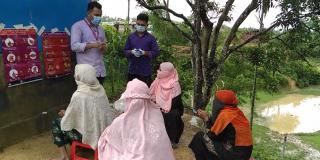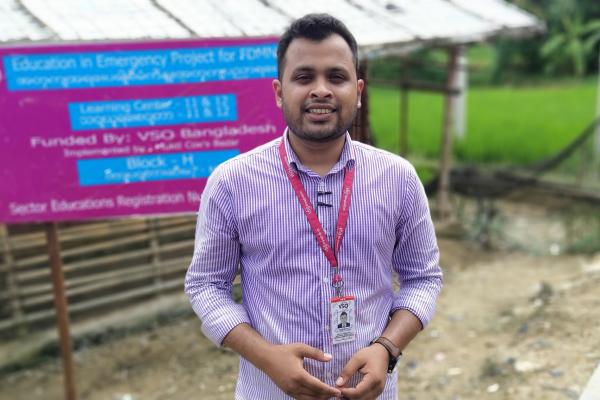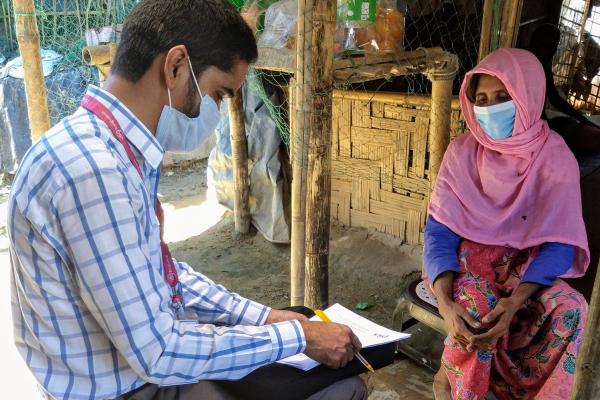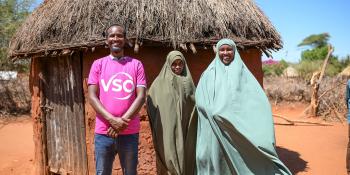
Bangladesh is one of the worst-hit countries in Asia by COVID-19, and its densely populated Rohingya refugee camps have been highlighted as one of the highest-risk areas by the Disasters Emergency Committee. Anup Goon shares what he's seeing on the ground and how volunteers like him are fighting to prevent a catastrophic outbreak in the camps.
There are almost one million people living in Bangladesh's Rohingya refugee camps. Extreme violence and persecution have forced people from their homes in Myanmar into cramped living conditions in Cox's Bazar. Amid the COVID-19 pandemic, the risks for a community that is already vulnerable are heightened in the densely-populated refugee camps.

Adapting to coronavirus in the refugee camp
Anup Goon, 26, is a VSO volunteer from Bangladesh in the refugee camps. He's delivering awareness sessions for project staff, volunteers and refugees, so that life-saving knowledge of the virus and how to stay safe can be shared.
Before the pandemic, Anup's focus in the Rohingya camps was to increase the quality of education for young children in the learning centres. In May 2020, COVID-19 spread throughout Bangladesh, arriving in the camps of Cox's Bazar. The learning centres were forced to close, with children encouraged to stay inside. Anup explains how he felt when COVID-19 hit the camp:
"We were so worried after getting the first confirmed COVID-19 case in the camps," said Anup.
"The Rohingya refugees were already in such a vulnerable situation after being forcefully displaced from their homes in 2017 and having to find shelter in Bangladesh. The COVID-19 pandemic has made their lives more vulnerable. When the first case was diagnosed in the camp, I was really worried for everyone's safety.
Social distancing measures meant there were restrictions in the camps and learning centers had to close. It was very stressful.Anup Goon
The country went into lockdown in early March in response to COVID-19. Social distancing measures meant there were restrictions in the camps and learning centres had to close. It was very stressful for the students and for us," said Anup.
"The children and parents are always asking us when the centres will reopen. They became very fond of the routine and having a space to play, learn and communicate. Now the children are growing frustrated and losing interest and enthusiam for education."
Training women and raising awareness of COVID-19
With crowded living conditions and rumours spreading throughout the camps, it was clear for Anup and his fellow VSO volunteers that hygiene and safety information had become the top priority.
"In the Rohingya camps, the housing is very crowded and it's very hard to carry out social distancing. I also saw that among the community, people did not have access to the correct information. For example, I heard people say that if you go to the mosque, the virus will not harm you."

"It was clear we needed to teach community members and highlight the correct safety information, especially to then reach their children," said Anup.
As a VSO volunteer, Anup received training on safety and COVID-19, which he was then able to pass onto community volunteers in the camp.
"We're training big sisters and mothers to spread knowledge around COVID-19. This is because most children get their knowledge from their mothers and caregivers so this way, we are able to reach the most people."
Fatema Khatun, 54, attended the sessions led by VSO and showed particular interest in the knowledge and safety information surrounding COVID-19. Soon after, Fatema was quick to organise a session for her family and people in the wider neighbourhood on the importance of social distancing, handwashing and spotting symptoms.
"If my neighbour gets infected, then my family will get infected. Who wants to take the chances!?" said Fatema, on her passion to share information.
As well as receiving training on hand washing and the importance of social distancing, the volunteer big sisters and mothers are also carrying out home visits to students whilst the learning centres are closed.
"They're inspiring them to learn at home, talk to the parents, and make sure that they encourage the children to continue studying at home and practise whatever they have learned at the centres," said Anup.
"We have to carry forward education because it is really hard for children to stay inside the home without learning or doing anything - education is a basic human need."
Through the training sessions, VSO has reached the parents of 2,580 children in the Rohingya camps.
Read more

A ripple of change: how VSO volunteers are transforming communities
Every act of volunteering begins with a choice — a decision to act out of a desire to make a difference. Across the world, VSO volunteers are proving that one spark of action can ignite something much bigger.

The two volunteers empowering girls and young women in Mozambique
Nelma and Carmirene and are two volunteers working on VSO's EAGLE project in Mozambique. For Nelma and Carmirene, education is not just about school, it is about meeting people where they are and using the right tools to challenging harmful norms. Here are their stories.
Opening doors to safety, education, and a brighter future
For girls in Karamoja, the poorest region in Uganda, being forced into early motherhood is all too common. This Christmas, you can open the doors to Safety, Education, and a Brighter Future.
